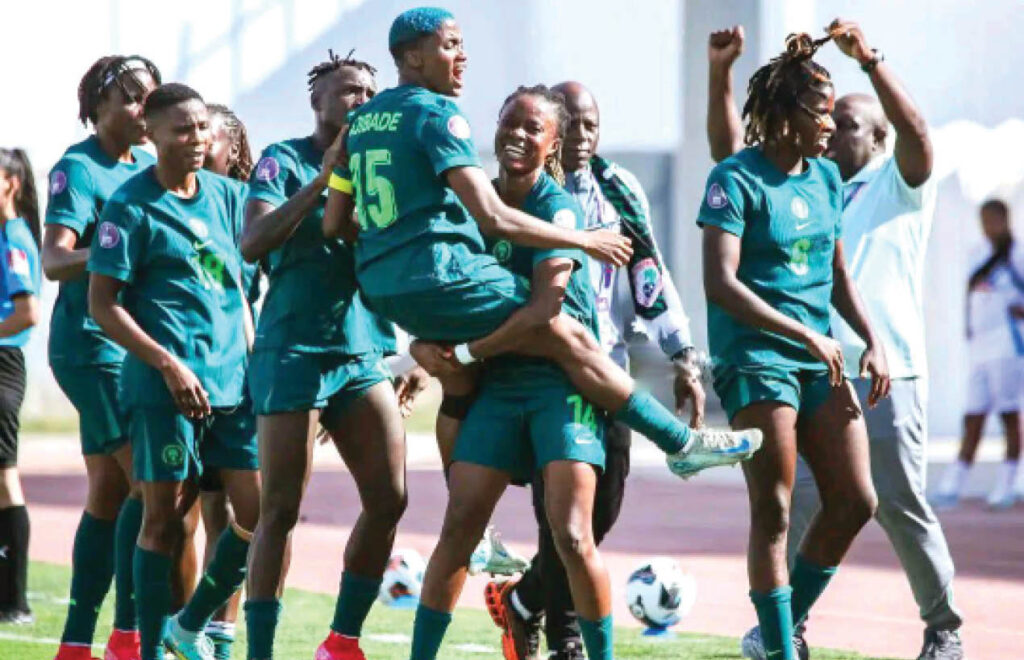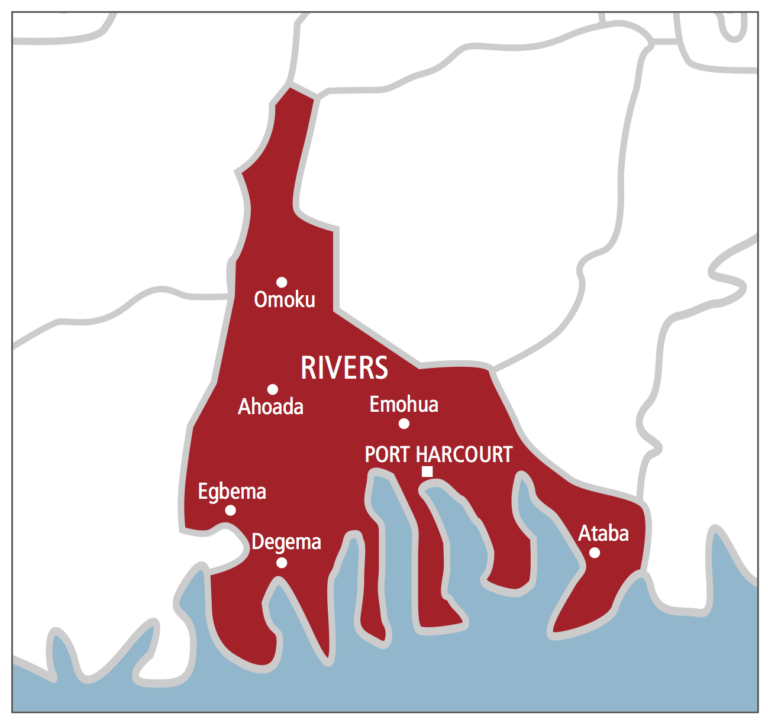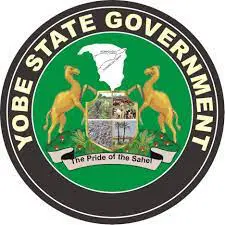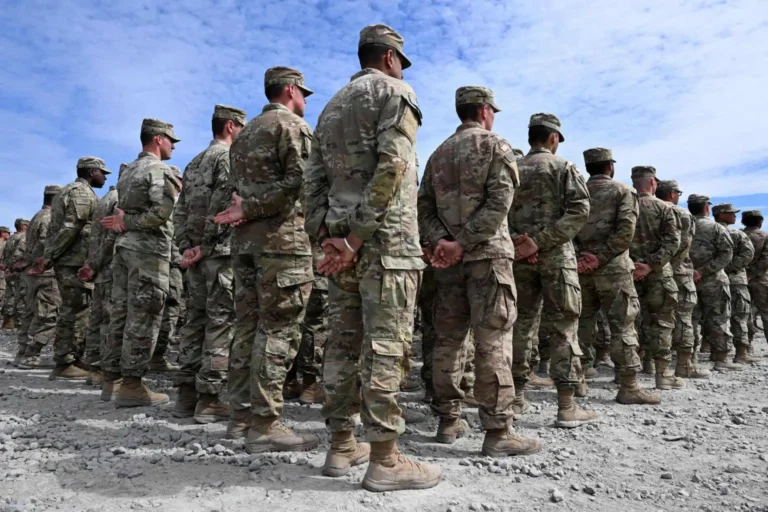
Their goals sent the Super Falcons to a record-extending 10th WAFCON final, keeping their unbeaten run intact.
The game, held at the Larbi Zaouli Stadium, began with Nigeria on the front foot. The Super Falcons dominated possession and looked sharp on the counter-attack. Ajibade, ever the danger in attack, was quick to capitalise on any opportunity.
Just before halftime, Nigeria was awarded a penalty after a foul inside the South African box. Ajibade stepped up and dispatched the ball past Andile Dlamini, putting Nigeria ahead in the 45th minute.
That first-half goal was a reflection of Nigeria’s controlled and disciplined approach. Michelle Alozie, who had been solid defensively, was also a constant threat going forward, linking up well with Chinwendu Ihezuo and creating multiple attacking opportunities. The Super Falcons went into the break with a 1-0 lead, looking strong but knowing Banyana Banyana would come out fighting in the second half.
True to their reputation, South Africa quickly responded. In the 60th minute, they were awarded a penalty of their own after a foul by Nigeria, levelling the score 1-1. The goal marked the first time Nigeria had conceded in the tournament, ending their run of clean sheets that had spanned four matches. The Super Falcons, however, pushed forward with renewed determination.
With just minutes left in regulation time, Michelle Alozie delivered the decisive blow. After a foul near the edge of the box, Alozie stepped up to take a free-kick from 35 yards out.
With incredible precision and power, she curled the ball over the wall, sending it past Dlamini into the top corner of the net. The stadium erupted as Nigeria’s players swarmed Alozie in celebration, their victory all but sealed with that stunning strike in the 90th minute.
With this win, Nigeria finally defeated South Africa in the Africa Cup of Nations after three consecutive losses in group-stage encounters, with South Africa winning 1-0 in 2018 and 2-1 in 2022.
The victory ensured Nigeria’s place in the final, where they will meet either Morocco or Ghana for a chance to claim their 10th continental title.
Super Falcons’ unmatched reign in African women’s football
The Super Falcons are Nigeria’s most successful women’s national football team, dominating African women’s football since their debut. Their legacy in the Women’s Africa Cup of Nations (WAFCON) is unmatched, having established themselves as the powerhouse of the competition.
The Super Falcons made their debut in the inaugural African Women’s Championship (now WAFCON) in 1991. Hosted in Nigeria, the Falcons wasted no time in making an impact, clinching the title with a 20 win over Guinea in the final. This victory set the tone for what would become a long period of dominance in African women’s football.
In 1991, the Super Falcons of Nigeria began their reign as the queens of African women’s football, capturing their first African Women’s Championship title. The tournament, held in Nigeria, marked a historic moment not just for the team, but for the entire continent. In a 2-0 victory over Guinea, the Super Falcons made their mark on African football, a triumph that set the foundation for what would become an era of dominance.
Fast forward to 1995, the Super Falcons were back, defending their crown in South Africa. The final against Ethiopia was a tense affair, and after a 0-0 draw, Nigeria held their nerve to win 4-2 on penalties. This victory not only retained their title but also proved their resilience, showing they could handle the pressure of big moments.
By 1998, Nigeria had become the undisputed force in African women’s football. Hosting the competition again, they faced fierce competition from South Africa in the final. But the Super Falcons were relentless, securing a 2-0 victory to win a third consecutive title, a feat that solidified their reputation as the continent’s elite.
The year 2000 saw Nigeria in a dramatic final against Cameroon. After an intense match that went into extra time, the Super Falcons once again triumphed 4-2, extending their reign to four titles. Their dominance was unquestioned, but it wasn’t over yet.
In 2003, they faced Cameroon once more. A 2-1 win in the final not only secured Nigeria’s fifth title but also reaffirmed their superiority over all challengers. However, the competition was growing tougher, with teams like Equatorial Guinea beginning to make a name for themselves.
After recent narrow defeats, Nigeria yesterday, overcame South Africa in a dramatic 2-1 semi-final win at the 2024 Women’s Africa Cup of Nations (WAFCON) in Casablanca, Morocco.
This win was the Super Falcons’ moment of redemption, avenging their 2022 loss to Banyana Banyana and solidifying their claim to African dominance.
The highly anticipated semi-final, often referred to as a “final before the final,” lived up to the hype. Rasheedat Ajibade and Michelle Alozie were the stars of the evening, delivering key performances when Nigeria needed it most.
Preview of potential final clashes with either Morocco or Ghana
The Super Falcons have experienced memorable and intense encounters with both Morocco’s Atlas Lionesses and Ghana’s Black Queens in the history of African women’s football.
In the past, Morocco was not seen as a major contender in African women’s football, but their rise over the past decade has made them one of the most promising teams on the continent. The Super Falcons and Morocco first met in the 2018 WAFCON, where Nigeria secured a 2–0 win in the group stage. Despite the loss, Morocco showed impressive defensive organisation, signalling their growing potential.
However, the 2022 WAFCON marked a turning point in the rivalry. As the host nation, Morocco faced Nigeria in the semifinals, a match that proved to be a defining moment. After a 1–1 draw in regulation time, the game went to penalties. Morocco triumphed 5–4, securing their first ever WAFCON final appearance. Looking ahead to potential 2024 WAFCON final, Morocco is now seen as a genuine contender. For Nigeria, reclaiming their title would reaffirm their dominance in African women’s football, while Morocco seeks to cement their meteoric rise by winning their first ever continental title.
Super Falcons vs Ghana’s Black Queens
The rivalry between Nigeria and Ghana is one of the most intense in African football, spanning both the men’s and women’s categories. The Super Falcons and the Black Queens have clashed numerous times, with Nigeria generally holding the upper hand.
The rivalry began in earnest during the 1991 WAFCON, where Nigeria defeated Ghana 2–0 in the final to claim the first of many continental titles. This victory marked the start of Nigeria’s dominance in African women’s football.
In 2003, the two teams met again in the WAFCON final. Nigeria won 1–0, extending their continental supremacy. But Ghana’s resilience kept the rivalry competitive, as they continued to test Nigeria’s dominance.
The 2010 WAFCON semifinals were another dramatic encounter, with the match ending in a goalless draw before Nigeria triumphed 4–2 in a penalty shootout, showcasing their composure under pressure.
In 2016, another narrow 1–0 victory for Nigeria in the semifinals propelled them to their 8th WAFCON title. The 2018 WAFCON saw the teams face off in the group stage, where Nigeria won 2–0 on their way to a 9th continental title. The Super Falcons’ dominance was clear, but Ghana proved their strength in the tournament, continuing to challenge Nigeria’s position.
The rivalry continued in the 2020 Olympic qualifiers, where Nigeria secured a 3–1 aggregate win to qualify for the Tokyo 2020 Olympics, while Ghana’s spirited performance showed their resilience and ambition.
We want to make history – Dikko
Reacting to the win, the National Sports Commission chairman, Mallam Shehu Dikko, praised the Super Falcons for their tenacity and urged them to remain focused on the ultimate prize.
“This victory was a display of who we are as Nigerians. The Super Falcons showed grit, class and composure under pressure. But the mission is not yet accomplished. Our eyes must remain on the trophy. We want to make history by lifting the WAFCON title for a record 10th time,” Dikko said.
The Director General of the NSC, Bukola Olapade also extended congratulations to the Nigeria Football Federation (NFFF) led by Alhaji Ibrahim Gusau, commending their leadership and the team’s preparation ahead of the tournament.
“The NSC commends the NFF board for putting the team in excellent shape. The team has put in a lot of hard work and its obvious to see, from the results. However, this is not the time to over celebrate. let’s stay locked in on the finals. Naija no dey carry last, so fight to be crowned African champions for the tenth time,” Olopade stated.
DAILY TRUST.




